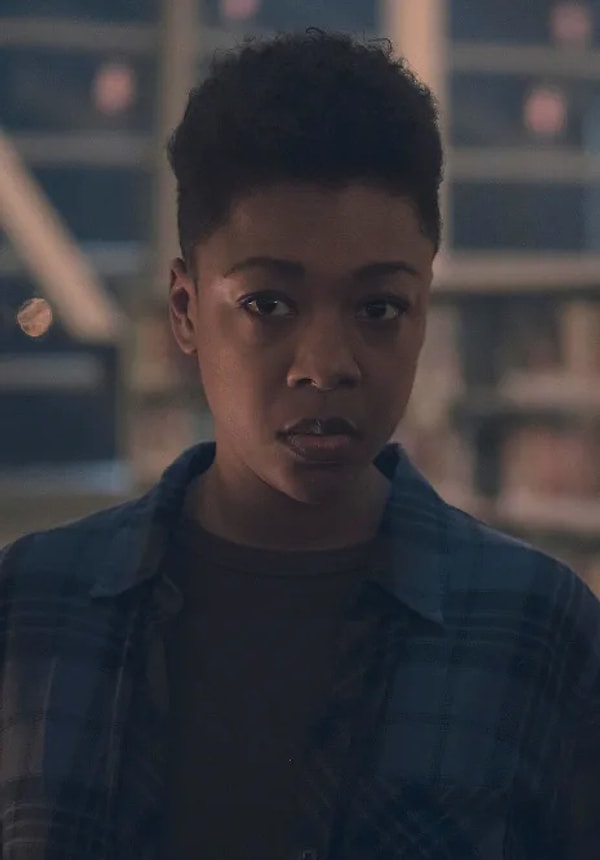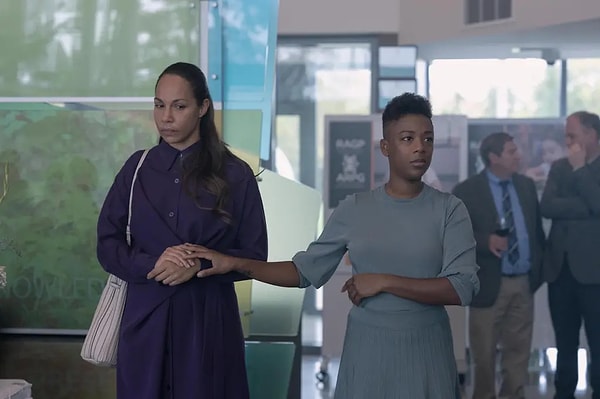Dreams to Come: Moira's Future in Canada
When Gilead froze all female bank accounts, revealing their true nature and intent to the world, Moira found herself standing in June's dining room guzzling a bottle of wine. She knew. She saw it coming. She didn't have the luxury of ignorance. She was a woman of color, a lesbian, and a radical feminist. She watched men debate her right to bodily autonomy, while the masses shamed gays and fought to deny them housing and jobs. When she was a child, Congress was arguing about whether or not spousal abuse should be prosecuted. To someone as informed as Moira, theocracy was always on the cusp, and equality was nothing more than a fragile whim.
It would've been impossible not to develop a cynical outlook. She laughed when she talked about what'd happened, but her sour face said it all. There was a rant on the tip of her tongue, ready to jump out when Luke walked into the room. She said that he was the f*cking problem and that women didn't need to be protected and owned. When he got frustrated and asked her if he should just go into the kitchen and cut off his dick, she said yes, and send it to the collective. They'd love that.
There's a certain kind of fury in her nature, something that pushes back, but it's not strength. It's a defense mechanism hiding a sensitive shell. We see it in her bared teeth and her pained expression. She understands hatred, prejudice, and the mass ignorance that hinders human rights. She was born into a world that loathed her, and what little respect she had earned had been ripped away by fascist bigots bent on control. She fought. She lost, and it stung.

Courtesy of Hulu
Life in Gilead
Moira's perceptive nature was her curse. She understood what was happening at the red center better than anyone else. That's why some of the most terrifying lines in season one came from her. She referred to handmaids as breeding stock, saying they didn't need eyes for their purposes. They weren't human; they were cattle, bred for one thing and one thing only. She knew how to act, how to stay quiet, and remain still. She was shocked by what the world had become. It seemed alien, but it was also eerily familiar. It was as if she had grown up in Gilead, and she was trying to warn the other girls about what it was like.
In their worst moments, when Aunt Lydia was brainwashing them and hunting down candidates for disfiguration, Moira was there; the perfect model slave, ready to give the girls the support they needed. But she recognized that she couldn't stay. She absorbed all of the trauma, the pain, and the rhetoric, and her psyche couldn't handle it. She had to leave or she was going to go insane.
When she was caught on her way to the border, she retained none of her usual resourcefulness and rebelliousness. She wasn't tagging up bathroom stalls or stealing aunt's uniforms and cattle prods like she did in the red center. She gave in to Gilead's oppression, recognizing that the smartest way to survive would be to do what she was told.

Courtesy of Hulu
Like so many caught within Gilead's borders after the regime change, Moira gave in to their most effective means of control. They'd grab a gun, stick it to your head, and push you until obedience became reflex. That's how they brought the country to heel, using fear and intimidation, shocking people out of their addiction to liberty. The public stopped trying to fight and escape. They gave in. By the time June found Moira at Jezebels, she thought she knew the way out: through the back door in a body bag.
June wouldn't let her give up, she pushed back, telling her to get her sh*t together. They were going to get Hannah, and they were going to leave. Inspired by June's words, Moira stole a truck and somehow made her to Canada.
She was broken, battered, and traumatized. She didn't believe in a world where generosity and kindness were possible. They had food and clothing, even health insurance cards, money, and shelter. She had everything she needed to start a new life, along with a familiar face; Luke to see her through.

Courtesy of Hulu
Submission
Once they had closed the borders, Gilead moved forward with purges and roundups. It happened fast--boots on the stairs, men bursting through doorways with machine guns raised, grabbing every woman they could find. They wasted no time in sorting them and assigning them with postings. But they hadn't begun the task of shaping the new nation. That happened while Moira was in the red center. So when she escaped, buildings had been torn down, the roads had been dug up, and the signs had been replaced with foreign pictographs. It was completely disorienting, like she had left one world and entered another. She could barely even find her way.
Gilead crashed down, permeating every aspect of her environment until she escaped, and she seemed to reenter the world she knew and loved. Canada looked exactly like the time before. The pace of life was familiar. There were normal neighborhoods, cars, and all of the conveniences and the technologies she lost with the fall of the U.S.
Moira emphasized healing in her life. She tried to find a path back to normalcy and inner peace, and once she found that path, she began helping others. She volunteered, facilitated support groups, and became a part of the welcoming committee that helped escaped victims of the regime.

Courtesy of Hulu
People would enter the country traumatized and paranoid. Many wouldn't have been able accept the fact that they were safe. Moira would help soothe those worries and ease them into a new way of life. They'd start to relax and stop looking over their shoulders. Eventually they'd be able to convince themselves that everything would be alright again.
The problem was that the world had changed. Canada was a small, relatively unguarded nation bordering history's most brutal dictatorship--one that had been toying with the idea of invasion for years. The Canadian government was justifiably scared of their neighbor to the south, so they started giving in to their demands. Moira's pop-psychology toolkit might've been perfect for the time before, but it had been luring refugees into a false sense of security and wellbeing. They were living like a gated community in the middle of a warzone. The bubble was always bound to pop.
We know from the epilogue in the first novel that Canada will begin roundups and extraditions of Gileadean refugees. It might not seem like it, but the series has been laying the groundwork for this for several years. Emily was interviewed to be sent back, and Canada's government showed signs of changing as early as season two.

Courtesy of Hulu
What to Expect in the Time After
There's nothing more terrifying than extradition. The people that Moira had helped to calm and heal will be wrenched from their new homes after spending years struggling to feel safe again. Some will die in irradiated wastelands. Others will be enslaved and violated for the rest of their lives. These are trauma victims, people who live with nightmares and flashbacks. They'd wake up at night sweating, unable to stop thinking about the things that had happened to them. Soon men with assault rifles will break down their doors and start forcing them onto buses.
There may be organizations and underground movements that can take them in, maybe even find them fake passports and train tickets. But Moira shunned people like that. She didn't have contact with the femaleroad or the No Man's Land smugglers. She considered guerrilla warfare to be nothing more than the product of shell-shocked minds. She knew about outposts and resistance members, but until season 5, she stayed away, dismissing them as dangerous and mentally ill. Now that she's been left behind in Canada, and her home has become unsafe, Mayday may be her only chance to avoid extradition. Rita is in the same boat. They're both guilty of serious crimes, making them eligible to be shipped back.
Mr. Tuello said that nobody wanted the refugees. That may or may not be true in the series. In the first epilogue, there was a lot of talk about England. Their distance and their nuclear arsenal would make them a worthy adversary, capable of taking in the lost souls who found themselves without anywhere else to go. They develop Save the Women campaigns, hoping to exert international influence, and eventually, they become a safe haven for people like Moira and Rita. But neither of them will have very much time to get there. Things have come to a serious breaking point. So let's hope they find their way out fast before it's too late.

Courtesy of Hulu
We were always supposed to see more of life in Canada, but due to a number of shakeups behind the scenes, the showrunners were forced to cut back. We've all seen the signs of this. The departure of Alexis Bledel, the actress who played Emily, made it even more difficult. They had an entire storyline planned with Rita and Moira, and they were forced to scrap it because of the part she was meant to play. Bruce Miller has promised that we will see more of Moira in the final season and probably Rita by extension.
We've also been told that the final season will be centered around fighting, whether or not to do so, and the ramifications that come with it. That will be the theme. It will also be about how to fight--with anger or with love. That is already a huge part of Moira's arc, so it's likely that she will choose one side or the other.
We haven't been given any further details about what to expect. But we can see very clearly that Canada is already purging refugees. It's not safe for Moira to leave her house, and it's obvious that things will escalate. Let's hope she takes the hint and finds a way to save herself.
Keşfet ile ziyaret ettiğin tüm kategorileri tek akışta gör!

Send Comment